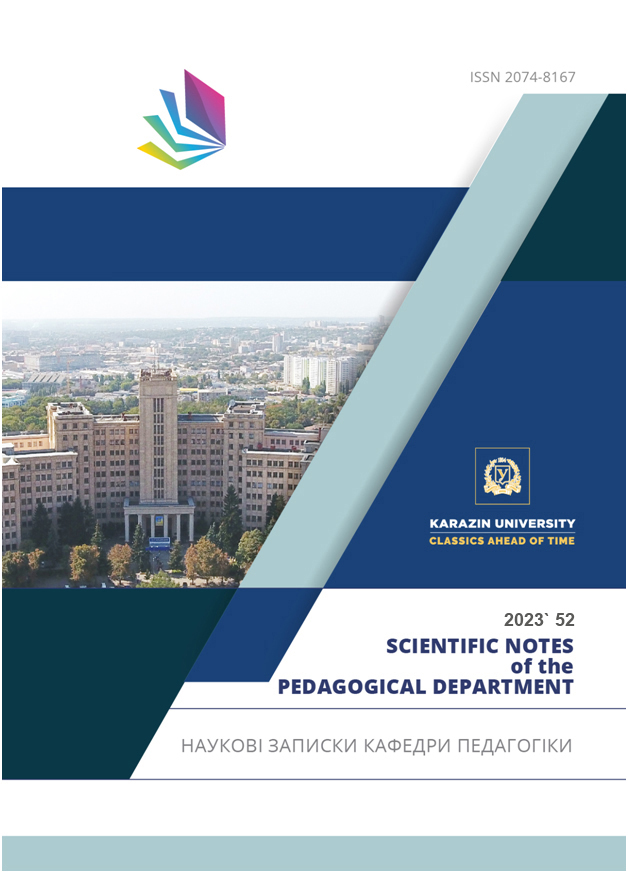Розвиток інтелектуальних здібностей дітей дошкільного віку засобами stem-освіти
Анотація
Статтю присвячено дослідженню поняття інтелектуальних здібностей дітей дошкільного віку. Визначено, що під інтелектуальним розвитком розуміють сукупність кількісних та якісних змін, які відбуваються у пізнавальних психічних процесах дитини під впливом середовища проживання та власного досвіду. Ядром інтелектуального розвитку є розумові здібності. Акцентовано, що розвиток інтелектуальних здібностей відбувається у різних видах діяльності дошкільнят: грі, конструюванні, навчальній діяльності тощо.
Досліджено вплив STEM-освіти на розвиток інтелектуальних здібностей дітей дошкільного віку. Доведено, що використання STEM-освіта сприяє створенню моделі освітнього середовища для ро- звитку передумов науково-технічної творчості та інтелектуальної активності дошкільнят, варіативності змісту освітнього процесу у групі, що дає можливість проявити ініціативу та самостійність у різних видах діяльності.
Для досягнення окресленої цілі використанні такі методи дослідження як аналіз та узагальнен- ня філософської та психолого-педагогічної літератури, державних документів із дошкільної освіти задля визначення термінологічного поля дослідження. Застосовано класифікацію та узагальнення наявних практичних напрацювань та власного педагогічного досвіду щодо впровадження STEM- освіти в освітній процес закладів дошкільної освіти.
Обґрунтовано ефективні методи та засоби для розвитку інтелектуальних здібностей учнів: робо- тотехніка, конструювання, ментальна арифметика, логічні задачі, експерименти, дослідження тощо. Встановлено, що STEM-освіта позитивно впливає на розвиток пізнавальних процесів дитини: відчут- тя, сприймання, пам’ять, мислення, мовлення, увага та уява. Наголошено на необхідність створення відповідних навчальних програм, лабораторій, центрів для формування STEM-навичок у дошкільнят
Завантаження
Посилання
Antonova, O., Antonov, O. & Polishchuk, N. (2022). STEM approach in education and teacher training for its implementation. Bulletin of Zhytomyr Ivan Franko State University. Pedagogical sciences. (110), 267-281. [in Ukrainian].
Baditsa, M. & Pitsyk, S. (2020). Development of intellectual abilities of senior preschoolers with the help of LEGO construction sets. Achievements and prospects of modern scientific research. Abstracts of the 1st International scientific and practical conference. Editorial EDULCP. Buenos Aires, Argentina. P. 21-27. [in Ukrainian].
Basic component o fpreschool education.StandardUkraine. (2021).Retrieved fromhttps://mon.gov.ua/storage/ app/media/rizne/2021/12.01/Pro_novu_redaktsiyu%20Bazovoho%20komponenta%20doshkilnoyi%20 osvity.pdf [in Ukrainian].
Vasilieva, L. (2020). Using Dienes logic blocks for intellectual development of preschoolers. Work experience of a preschool teacher: traditional approaches and innovations: materials of the All-Ukrainian Scientiϔic and Practical Conference (Uzhhorod, May 19, 2020). Uzhgorod: Center for Progressive Education “Genezum”. Part II, Р. 420. [in Ukrainian].
Voloshchuk, I. (2023). Intelligence development: Ariadne’s thread not found. Education and development of a gifted personality. V.10. Р.13-17. [in Ukrainian].
Voloshchenko, O. & Koval, Y. (2019). Educational and developmental potential of lego technologies in the development of cognitive activity of children of senior preschool age. Educational discourse: collection of scientific works. № 11 (3). Retrieved from https://enpuir.npu.edu.ua/bitstream/handle/123456789/24512/ Voloschenko.pdf?sequence=1 [in Ukrainian].
Hazina, I. (2017). Development of Intellectual Abilities in Preschool Children by Means of Pedagogical Innovations by V. Voskobovych. Preschool education in the modern sociocultural space: coll. of science works Poltava: Publisher Shevchenko R., Vol. 1. Р. 53–59. [in Ukrainian].
Dotsenko, S., Havrysh, I. & Shcherbakova, O. (2017). STEM-education as a means of enhancing the creative potential of the individual within the framework of the scientiϐic and pedagogical project «Intellect of Ukraine». Perspectives of research and development: сollection of scientific articles. Dublin. Ireland. P. 119-125. [in Ukrainian].
Dotsenko, S. (2021). STEM education: scientific discourse and educational practices. Native school. № 3, Р.31-35. [in Ukrainian].
Kant, I. (2000). A critique of pure reason. Kyiv. Universe, 504 s. [in Ukrainian].
Standard Ukraine. The concept of development of science and mathematics education (STEM education) (2020).
Retrieved from https://zakon.rada.gov.ua/laws/show/960-2020-%D1%80#n8 [in Ukrainian].
Moliako, V. (2008). Methodological and Theoretical Problems of the Study of Creative Activity. Strategies of creative activity: school of V. O. Molyako. Kyiv: Education of Ukraine. 702 s. [in Ukrainian].
Morze, N., Strutynska, O. & Umryk, M. (2018). Educational robotics as a promising area of STEM education development. Electronic scientiϔic publication “Open educational e-environment of a modern university». (5), S. 178-187. [in Ukrainian].
Panhelova, N. (2014). Theoretical and methodological bases of formation of harmoniously developed personality of preschool child in the process of physical education. Kyiv: National University of Physical Education and Sports of Ukraine. [in Ukrainian].
Pidlypniak, I. & Duka, T. (2020). Intellectual Development of Preschool Children in the Conditions of Modern
Preschool Education Institution. Scientific journal of the M.P. Drahomanov NPU. Р.40-43. [in Ukrainian].
Rybalko, A., Rybalko, O. & Zakharchuk, O. STEM-research of schoolchildren in instrumentation. Collection of research papers kamianets-podilskyi national. Retrieved from https://mvf.kpnu.edu.ua/wp-content/ uploads/2023/02/zbirnik-28_2022.pdf#page=19 [in Ukrainian].
Roma, O., Blyzniuk, V. & Boruk, O. (2016). Program for the development of children from 2 to 6 years old and methodological recommendations “The boundless world of play with LEGO». The LEGO® Foundation.140 c. [in Ukrainian].
Ulkina, T. (2005). Prohrama z dystsypliny “Dytiacha psykhodiahnostyka”. Practical psychology: Complex of typical educational programs K.: NPU named after M.P. Drahomanova, LLC «Osnova». V.2. Р. 93 - 97. [in Ukrainian].
Khutorna, N. & Sanduhei, V. (2021). Experimental study of the development of intellectual abilities of senior preschool children by means of mental arithmetic. Trends in the development of preschool and primary education: youth and science: a collection of theses of the 2nd All-Ukrainian scientiϔic and practical conference with international participation. Part 2. Kyiv. NPU named after M.P. Drahomanova, 2021. 379 s., pp. 223-225. [in Ukrainian].
Shysh, Y. (2014). Peculiarities of mental abilities of older preschoolers. Retrieved from https://nauka-online. com/wp-content/uploads/2021/09/SHish.pdf [in Ukrainian].
Gardner Howard. (1983). Frames of Mind: The Theory of Multiple Intelligences New York : Harper and Row,.
p. Retrieved from https://www.amazon.com/Frames-Mind-Theory-MultipleIntelligences. [in English].
Heckman, J. (2006). Skill formation and the economic of investing in disadvantaged children. Science. 312 (6).
-1902.
Xenia Naidenova. J. (2001). Piaget’s theory of intelligence: Operational aspect. Retrieved from https://www. researchgate.net/publication/266274565_J_Piaget’s_theory_of_intelligence_Operational_aspect.

